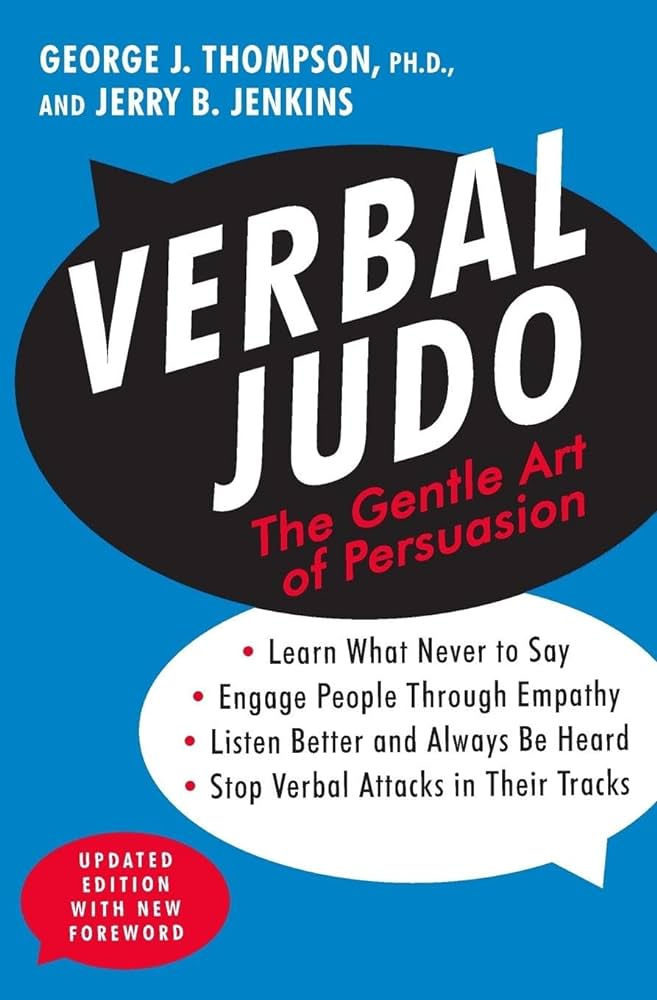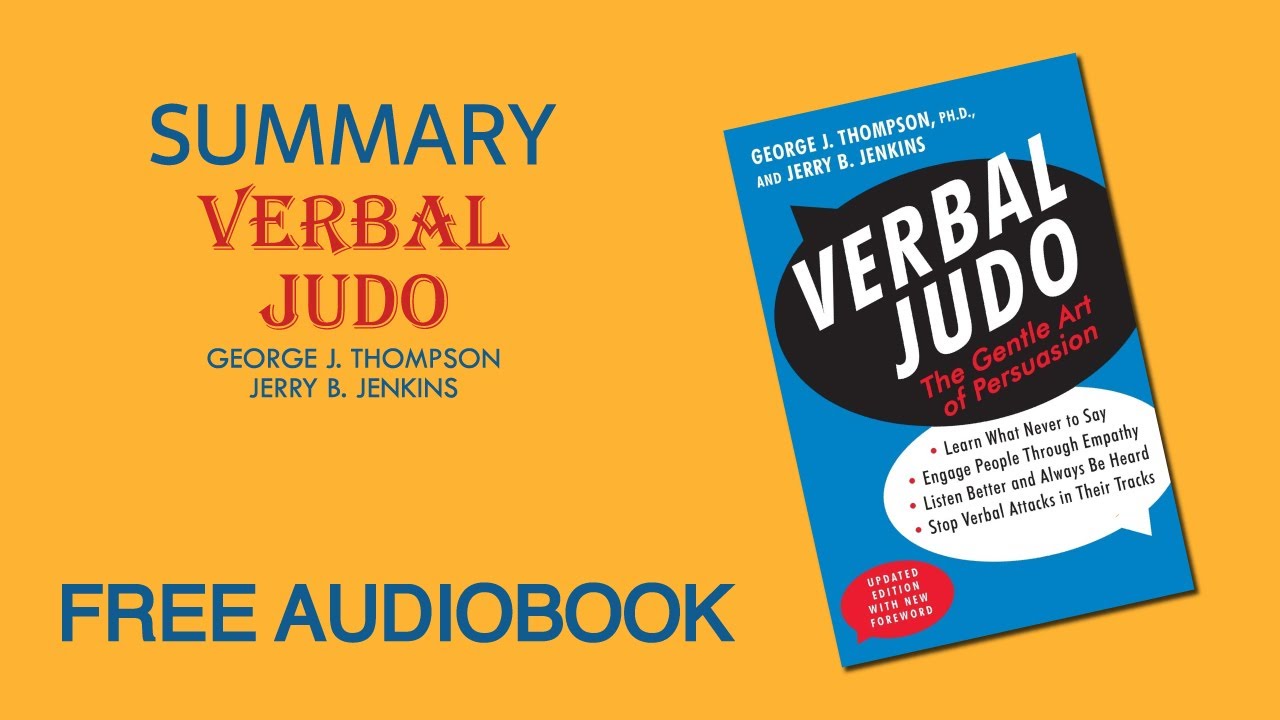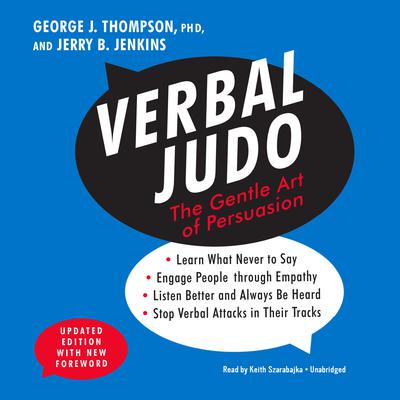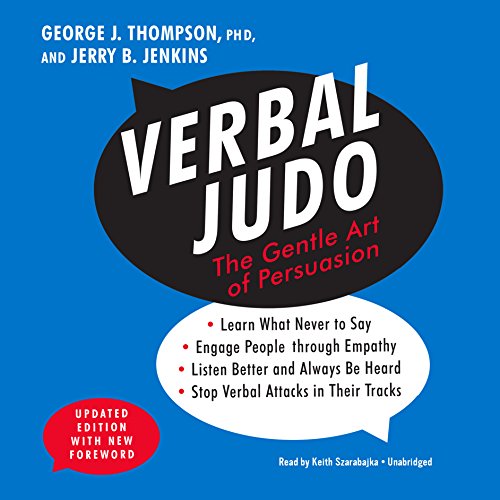George J. Thompson’s “Verbal Judo” audiobook teaches effective communication techniques for conflict resolution. It emphasizes empathy and tactical language use.
“Verbal Judo: The Gentle Art of Persuasion” by George J. Thompson is a powerful guide for mastering communication. The audiobook reveals strategies for managing confrontations and diffusing tension through language. It provides practical advice on turning hostile situations into constructive dialogue.
Thompson, a former police officer, uses his experience to illustrate these techniques. Listeners learn to maintain control, show empathy, and achieve positive outcomes. The methods shared are applicable in various settings, from personal relationships to professional environments. Enhancing your communication skills with “Verbal Judo” can lead to more effective and harmonious interactions.

Credit: www.amazon.com
The Genesis Of Verbal Judo
The Verbal Judo audiobook by George J. Thompson is a transformative guide. It teaches effective communication and conflict resolution. This section delves into its origins.
Thompson’s Background
George J. Thompson had a varied career. He was a police officer, professor, and martial artist. His diverse experience shaped Verbal Judo.
Thompson earned a Ph.D. in English. His academic background helped him understand language deeply. His police work exposed him to conflict situations. He saw a need for better communication methods.
Concept Origin
The idea of Verbal Judo came from martial arts. Just like physical judo uses an opponent’s energy, Verbal Judo uses words. It redirects negative energy to achieve positive outcomes.
Thompson combined his knowledge of language and martial arts. He developed techniques to defuse conflicts verbally. His methods became the foundation of Verbal Judo.
Verbal Judo focuses on understanding and empathy. It teaches how to listen actively and respond effectively. These skills are crucial in high-stress situations.
| Key Elements | Description |
|---|---|
| Empathy | Understanding the other person’s perspective. |
| Respect | Treating others with dignity, even in conflict. |
| Listening | Active listening to understand the real issue. |
| Deflection | Redirecting negative energy into positive outcomes. |
These elements make Verbal Judo unique. It is a powerful tool for anyone facing conflicts. Thompson’s audiobook provides practical advice and real-life examples. It is an essential listen for improving communication skills.
Core Principles Of Verbal Judo
The Verbal Judo Audiobook by George J. Thompson teaches powerful communication skills. The core principles help people handle conflicts and build better relationships. Let’s dive into these principles.
The Art Of Listening
Listening is more than just hearing words. It means understanding the speaker’s message and feelings. Active listening helps you connect with others. It shows respect and builds trust.
To practice active listening, follow these steps:
- Make eye contact.
- Nod to show you are paying attention.
- Ask clarifying questions.
- Paraphrase what the speaker said.
These steps ensure you truly understand and respond appropriately.
The Power Of Empathy
Empathy is the ability to understand and share another person’s feelings. It is a key component of Verbal Judo. Showing empathy can defuse tension and build rapport.
Here are ways to show empathy:
- Validate the speaker’s feelings.
- Use phrases like “I understand” or “That sounds tough.”
- Avoid judging or criticizing the speaker’s emotions.
Empathy helps create a safe space for open communication.
| Principle | Description |
|---|---|
| Active Listening | Understanding the speaker’s message and feelings. |
| Empathy | Sharing and understanding another person’s feelings. |
These core principles of Verbal Judo can transform your communication skills.
Impact And Applications
George J. Thompson’s Verbal Judo Audiobook has transformed communication. Its lessons have a wide range of applications. This section explores two key areas where its impact is profound: law enforcement and everyday communication.
In Law Enforcement
Law enforcement officers face tough situations daily. Thompson’s techniques provide them with vital tools. Verbal Judo teaches officers to stay calm and gain control. This reduces conflict and promotes safety.
Here are some benefits for officers:
- Improved de-escalation skills: Officers learn to defuse tense situations.
- Enhanced community relations: Effective communication builds trust.
- Increased officer safety: Less physical confrontation means fewer injuries.
Officers trained in Verbal Judo can handle disputes better. They use words as their primary tool, not force. This is crucial for modern policing.
Everyday Communication
The principles of Verbal Judo extend beyond law enforcement. They are useful in everyday interactions as well. People can apply these techniques to improve personal and professional relationships.
Consider these everyday applications:
| Scenario | Verbal Judo Application |
|---|---|
| Workplace conflict | Resolve issues calmly and effectively. |
| Family disagreements | Communicate clearly to reduce misunderstandings. |
| Customer service | Handle complaints without escalating the situation. |
Verbal Judo helps people communicate better. It empowers them to turn conflict into conversation. This makes daily interactions smoother and more productive.

Credit: www.youtube.com

Credit: audiobookstore.com
Conclusion
Mastering communication is essential for personal and professional growth. George J. Thompson’s “Verbal Judo” audiobook offers invaluable strategies. Implement these techniques to enhance your interactions and resolve conflicts effectively. Give this audiobook a listen to transform your communication skills and boost your confidence.
Embrace Verbal Judo and watch your relationships flourish.



